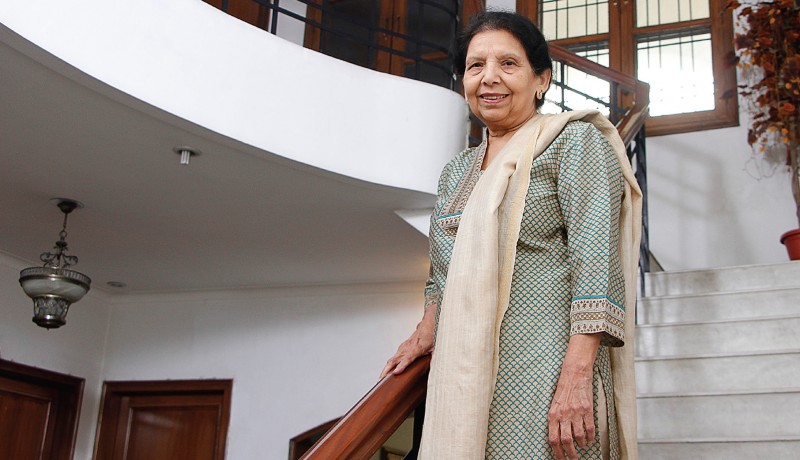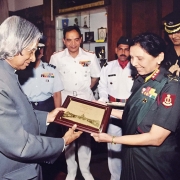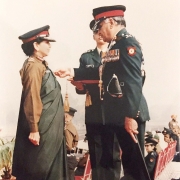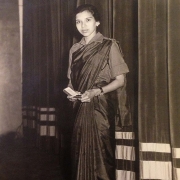
People

Dr Punita Arora, 71, New Delhi
First woman Lieutenant-General in the Indian Armed Forces (2004), Commandant of the Armed
Forces Medical College (2004), Vice-Admiral in the Indian Navy (2005)
Dr Punita Arora is quite the opposite of what you would imagine her to be. But, then, the petite and doting grandmother has been bucking stereotypes all her life.
Commissioned into the Army Medical Corps in 1968, Dr Arora blazed a trail in an overwhelmingly male bastion and set three weighty milestones in two of the three Services, the Army and the Navy. No, there are no glass ceilings, smiles Dr Arora, a gynaecologist with 15 medals to her credit.
A far cry from her former field routine, the retired officer now begins her day doing the rounds at the Women’s Centre in Privat Hospital, Gurgaon, a medical facility focused on women and childcare. But she is happy to oblige with stories of a career that was as adventurous as it was distinguished. With three coveted ‘firsts’ to her name, did she plan on setting any records? “No, I just did my duty and the rest followed,” she responds.
Dr Arora is a child of Partition, her family having moved from Lahore across the border to Saharanpur in Uttar Pradesh, where her father was posted in the Indian Army. He had risen to the rank of captain and wanted his daughter to have a bright future. He encouraged her to become a doctor, which is how she ended up studying science at the government college in Saharanpur.
That’s when the budding iconoclast got her first taste of what was to come—she was told it was a boy’s college and she would have to find two more girls if she wanted to be admitted there. No guesses how that panned out! Next, she secured admission to the Armed Forces Medical College (AFMC) in Pune, which was no mean feat for a woman back in the day. She emerged a gold medallist. After completing her internship in Ambala and Fatehgarh, the young doctor got married to an Army captain. Her husband, Brig PN Arora (retd) is a practising dermatologist in Gurgaon; her son is a dermatologist in the Army; and her daughter, who was a general duty medical officer in the Army, is now a cardiologist in the US.
For a woman carving a career in the Army, life is often like a combat zone; Dr Arora learnt that early on. The challenge began with her choice of speciality. Even though she was a gold medallist and entitled to take up surgery, the young and talented doctor was forced to take up gynaecology and obstetrics, as it was more woman-oriented. “I wanted to be a surgeon but the Army wanted women doctors to take care of the families.” Nevertheless, when it came to being treated on a par with her male colleagues, she discovered ‘equality’ down in the trenches. Dr Arora even lived in bunkers in Ladakh, where she was visiting her husband, who was posted there at the time.
The decorated Army officer also recounts an anecdote about a posting to Jalandhar, where Col Ghosh was “dreading getting a lady gynaecologist in his unit”. “There was fear that I would demand special facilities such as attendants with me or that I would not be able to attend on late-night emergencies as I had two small children,” she says with a chuckle. Two years later, the colonel did an about-turn. “He said he would always keep a lady officer in his unit. We are perceived according to how we conduct ourselves and that’s the important thing.”
Even as a doctor, life in the Army was full of action. “In 2001, during the Kaluchak terrorist attack, I had to hold the fort at the hospital, where 70 wounded soldiers were brought in, 23 dead,” says Dr Arora, who was then commanding the Military Hospital in Jammu. Her valiant effort earned her the Vishisht Seva Medal. “There is fear of how a woman will hold up during a crisis; it is for the woman to hold on with sheer will and determination and take the right steps to win everyone’s confidence.” Among her many awards, she cherishes the Sena Medal for establishing gynaecological endoscopy and oncology facilities in the Armed Forces hospitals. There were no fertility clinics in those days, she points out, and there were many issues relating to childbirth.
Take, for instance, Army wives 34 year-old Veena Kapoor and Hansveen Kaur, 32, who had both suffered miscarriages owing to medical complications, and had given up hope of ever having children. Dr Punita Arora was destined to be theirsaviour—she suggested a procedure called transabdominal cerclage, where the woman’s abdomen is stitched in the 11th week of pregnancy, so the baby stays in the right position. Both Kapoor and Kaur, who are mothers today, call Dr Arora their ‘fairy godmother’. “She always said that whatever you do, do it with good intentions and hope for a positive outcome. I have never forgotten that,” says Kaur. “She gives you all the emotional support you need and is always around, even when you call her in the middle of the night. She is a very positive person.”
Whether as a doctor or administrator, Dr Arora’s achievements are many. But her crowning moment came in 2004, when she was promoted as lieutenant-general. That same year, she did it again, by becoming the first woman commandant of the AFMC. She achieved her third ‘first’ when she was appointed vice-admiral in the Indian Navy, in 2005, when she was appointed Director General of Medical Services (Navy). The Armed Forces Medical Services has a common pool of officers who can migrate from one service to another, depending on requirements, especially at the senior level, she says of switching services.
While in the Services, Dr Arora had little time for recreation, which is why she now loves kicking her feet up and watching serials and travel shows on TV. After she retired in 2006, she has been enjoying her daily walk, which keeps her shipshape. But her phone is always within earshot. “What if there’s an emergency at the hospital [Privat]?” No, this lady will never hang up her boots!
- My success story: “I joined AFMC as my father wanted me to study there. But once I did, I loved everything about it. We are Indians and take pride in it. I designed a gold bracelet that has the symbols of all our major religions and I wear it all the time. Even now, when I see an Army truck or an ambulance go by, I feel it’s mine.”
- Challenges: “We live in a male-dominated world and a woman needs to constantly prove herself. As a leader, she has to show that she can hold the fort during a crisis and I always kept that in mind. Finally, people look at the capability of the leader and not the gender. A leader needs to prove, ‘Yes, I can.’”
- Lessons learnt: “We must have compassion. The Army taught me that we are a close-knit family and soldiers live in tough conditions. The Army inculcates discipline and how to spend wisely. It teaches you to be resilient and to be an Indian before anything else. Kindness and positivity are important values. We must praise at least one good action daily.”
- Aspirations, goals and vision: “To keep doing my work diligently. This was instilled in me since childhood. I love my patients and life is beautiful.”
- The way forward: “I still attend seminars and lectures. I always take rounds in the morning and evening at the hospital. Learning never stops. I love teaching, that is, training people. I am also part of the Gurgaon Gynaecological Society.”
- Awards & achievements: Param Vishisht Seva Medal (2007); Vishisht Seva Medal (2002); Sena Medal (1997)
—Ambica Gulati
Photo: Himanshu Kumar Archival images courtesy: Dr Punita Arora Featured in Harmony — Celebrate Age Magazine March 2017
ON STRIKE!
NO FORMULA HERE
OH, BABY!
I SPY
MARTIAL LAW
AT THE WHEEL
you may also like to read
-
For the love of Sanskrit
During her 60s, if you had told Sushila A that she would be securing a doctorate in Sanskrit in the….
-
Style sensation
Meet Instagram star Moon Lin Cocking a snook at ageism, this nonagenarian Taiwanese woman is slaying street fashion like….
-
Beauty and her beast
Meet Instagram star Linda Rodin Most beauty and style influencers on Instagram hope to launch their beauty line someday…..
-
Cooking up a storm!
Meet Instagram star Shanthi Ramachandran In today’s web-fuelled world, you can now get recipes for your favourite dishes at….










